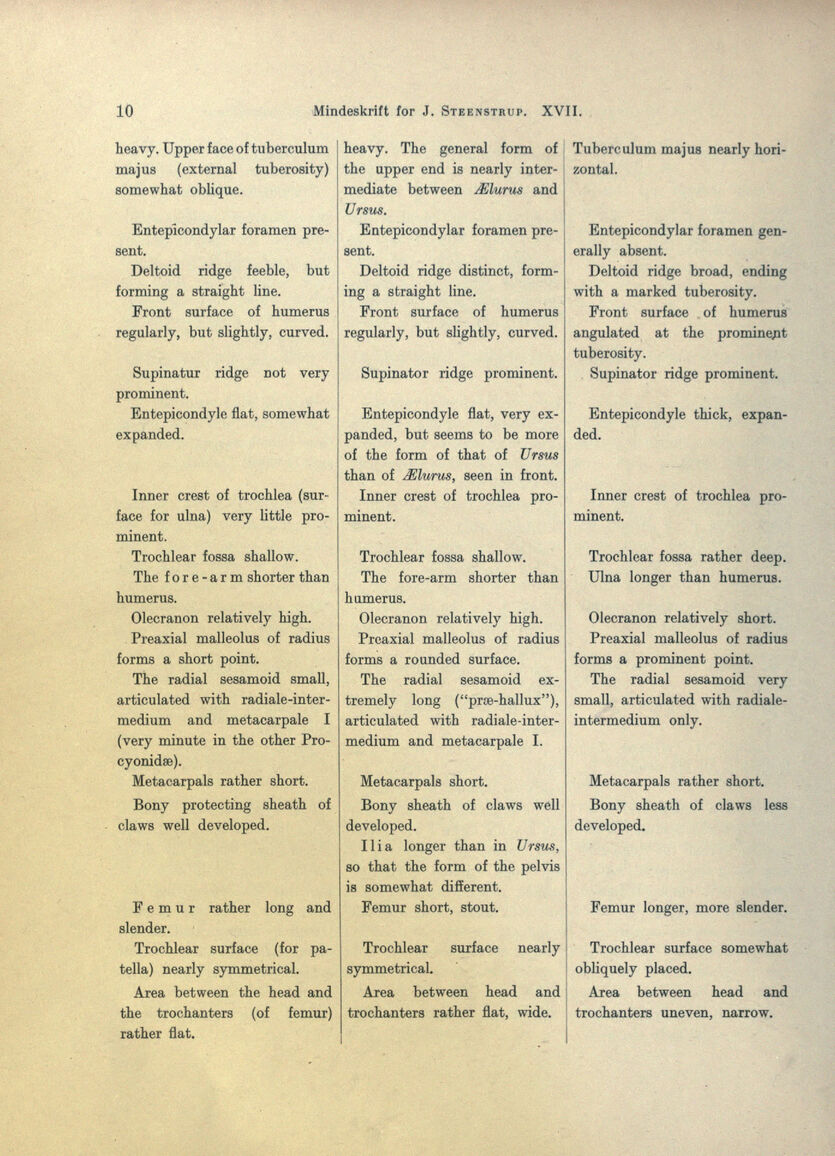
Full resolution (JPEG) - On this page / på denna sida - On the Systematic Position of Æluropus Melanoleucus

<< prev. page << föreg. sida << >> nästa sida >> next page >>
Below is the raw OCR text
from the above scanned image.
Do you see an error? Proofread the page now!
Här nedan syns maskintolkade texten från faksimilbilden ovan.
Ser du något fel? Korrekturläs sidan nu!
This page has been proofread at least once.
(diff)
(history)
Denna sida har korrekturlästs minst en gång.
(skillnad)
(historik)
| Head of humerus rather heavy. Upperface of tuberculum majus (external tuberosity) somewhat oblique. | | | | | | Head of humerus rather heavy. The general form of the upper end is nearly intermediate between Ælurus and Ursus. | | | | | | Head not rather heavy. Tuberculum majus nearly horizontal. |
| Entepicondylar foramen present. | | | | Entepicondylar foramen present. | | | | Entepicondylar foramen generally absent. |
| Deltoid ridge feeble, but forming a straight line. | | | | Deltoid ridge distinct, forming a straight line. | | | | Deltoid ridge broad, ending with a marked tuberosity. |
| Front surface of humerus regularly, but slightly, curved. | | | | | Front surface of humerus regularly, but slightly, curved. | | | | | Front surface of humerus angulated at the prominent tuberosity. |
| Supinatur ridge not very prominent. | | | | Supinator ridge prominent. | | | | Supinator ridge prominent. |
| Entepicondyle flat, somewhat expanded. | | | | | | Entepicondyle flat, very expanded, but seems to be more of the form of that of Ursus than of Ælurus, seen in front. | | | | | | Entepicondyle thick, expanded. |
| Inner crest of trochlea (surface for ulna) very little prominent. | | | | Inner crest of trochlea prominent. | | | | Inner crest of trochlea prominent. |
| Trochlear fossa shallow. | | | Trochlear fossa shallow. | | | Trochlear fossa rather deep. |
| The fore-arm shorter than humerus. | | | | The fore-arm shorter than humerus. | | | | Ulna longer than humerus. |
| Olecranon relatively high. | | | Olecranon relatively high. | | | Olecranon relatively short. |
| Preaxial malleolus of radius forms a short point. | | | | Preaxial malleolus of radius forms a rounded surface. | | | | Preaxial malleolus of radius forms a prominent point. |
| The radial sesamoid small, articulated with radiale- intermedium and metacarpale I (very minute in the other Procyonidæ). | | | | | | | The radial sesamoid extremely long (“præ-hallux“), articulated with radiale-intermedium and metacarpale I. | | | | | | | The radial sesamoid very small, articulated with radiale-intermedium only. |
| Metacarpals rather short. | | | Metacarpals short. | | | Metacarpals rather short. |
| Bony protecting sheath of claws well developed. | | | | Bony sheath of claws well developed. | | | | Bony sheath of claws less developed. |
| | | | | Ilia longer than in Ursus, so that the form of the pelvis is somewhat different. | | | | | ||
| Femur rather long and slender. | | | | Femur short, stout. | | | | Femur longer, more slender. |
| Trochlear surface (for patella) nearly symmetrical. | | | | Trochlear surface nearly symmetrical. | | | | Trochlear surface somewhat obliquely placed. |
| Area between the head and the trochanters (of femur) rather flat. | | | | | Area between head and trochanters rather flat, wide. | | | | | Area between head and trochanters uneven, narrow. |
<< prev. page << föreg. sida << >> nästa sida >> next page >>